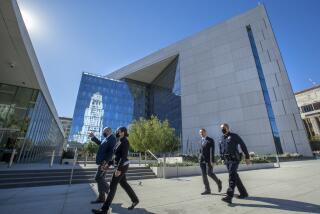High Court Rebuffs Effort to Shield Officials From Suits : Appeal: Ruling holding lawmakers personally liable for damages is allowed to stand. Federal action clears way for lawsuit against council members who used city funds to pay judgment.
- Share via
WASHINGTON — In a setback for the Los Angeles City Council and local lawmakers across the West, the Supreme Court let stand a ruling Monday under which elected city officials can be forced to pay damages personally in some instances for their official actions.
Without comment or dissent, the justices refused to hear the Los Angeles city attorney’s argument that local lawmakers are entitled to “absolute immunity” from such damage suits.
In March, a federal appeals court in San Francisco ruled that although legislators cannot be sued for passing laws, they can be held personally liable for decisions that are “administrative or executive in nature.” The decision cleared the way for 10 current and former Los Angeles City Council members to be sued for using city funds to pay court damages assessed against former Police Chief Daryl F. Gates and nine police officers in a 1990 brutality case.
The high court did not issue a written ruling endorsing the appeals court decision, nor has the lawsuit against the Los Angeles council members gone to trial. Still, Monday’s court action puts lawmakers on notice that they have to pay from their own pockets if their actions violate a person’s constitutional rights.
“I think this is going to have a long-term impact on governing bodies,” said Councilman Zev Yaroslavsky. Elected officials will have to think twice before getting involved in volatile disputes, such as police brutality cases, he said.
Attorney Stephen Yagman cheered the court’s action and said it means that elected officials can be held personally responsible if they condone police brutality.
“I think they are trapped,” Yagman said of the past and present City Council members facing the damage lawsuit. “They have ratified a policy of using excessive force. Now the noose is around their collective neck, and it’s getting tighter.”
The decision stemmed from a 1990 incident in which a team of police officers gunned down four suspected robbers outside a McDonald’s restaurant in Sunland. Yagman filed suit on behalf of four family members of the suspects, contending that the police, all members of the Special Investigations Section, fired on them without provocation and used excessive force.
A jury handed down a $44,000 verdict against Gates and the nine officers. In reaction, the City Council voted to pay the damages for Gates and the officers. Yagman then filed a new lawsuit arguing that the council’s action amounted to condoning police brutality and asking for unspecified damages from the council members personally.
The lawsuit is awaiting trial. City attorneys hoped to have it dismissed in preliminary motions but instead have suffered a series of stunning reversals.
In general, the Supreme Court has said that lawmakers are entitled to “absolute immunity . . . in their legislative functions.” But in a pair of rulings siding with Yagman, federal judges in California have concluded that lawmakers are not immune from damage claims in certain circumstances.
First, U.S. District Judge J. Spencer Letts in Los Angeles said that the 10 City Council members who voted to shield Gates and the other officers were not “dealing with legislation which will affect the public at large,” but rather were taking one side in a legal dispute over police brutality. By doing so, the council members could be “giving complete license for bad-faith acts” by the police, the judge said, and therefore they can be held liable for their actions.
In March, the U.S. 9th Circuit Court of Appeals, whose jurisdiction covers the entire West, affirmed Letts’ decision and ruled that lawmakers are not entitled to “a cloak of absolute immunity” when they “perform an administrative, not a legislative, act.”
City Atty. James K. Hahn appealed to the high court, arguing that this rule, if allowed to stand, could “chill” elected officials in the exercise of their duties. But the high court issued a one-line order Monday dismissing the appeal.
In one sense, the outcome is consistent with other high court rulings. For example, judges are absolutely immune from being sued over their actions in court, but they can be sued if, as an employer, they practice illegal discrimination or sexually harass a subordinate.
But in the rule set by the 9th Circuit concerning local lawmakers, the line between an “administrative” action by the council and a “legislative function” is hardly crystal clear.
Lawyers who represent local governments said that Monday’s high court decision will frighten elected representatives.
“Particularly in the small jurisdictions where you have the real citizen-legislators, this will have a profound impact,” said attorney Timothy Coates, who filed a brief on behalf of city and county officials in 18 California jurisdictions urging the high court to intervene.
The case against the Los Angeles council members now moves to trial. Donald Vincent, supervising deputy city attorney, said that he will ask Letts to rule that council members are entitled to “qualified immunity” from the damage claim on the grounds that they acted in good faith and without malice.
But Yagman said he will present evidence showing that the council routinely paid huge damage claims against police officers, which should lead to a large damage verdict against members. If that occurs, the council members could appeal the verdict to the 9th Circuit Court in San Francisco and to the U.S. Supreme Court.
The current and former council members cited in the suit are Joel Wachs, Joy Picus, John Ferraro, Yaroslavsky, Ruth Galanter, Ernani Bernardi, Marvin Braude, Hal Bernson, Michael Woo and Joan Flores.
Savage reported from Washington and Berger reported from Los Angeles.
More to Read
Sign up for Essential California
The most important California stories and recommendations in your inbox every morning.
You may occasionally receive promotional content from the Los Angeles Times.













